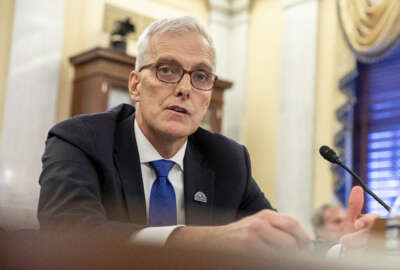Senators want to scrap TSA’s use of facial recognition
In today's Federal Newscast: Some Senators have introduced legislation to scrap TSA's use of facial recognition at airports. The Office of Special Counsel warns...
- The General Services Administration is defending its robotics process automation program (RPA) against new criticism from the inspector General. GSA is pushing back against a new report from the GSA IG claiming its robotics process automation program does not save money or time. GSA said the IG's analysis is nearly two years old and its RPA program has matured since 2021. Among the ways the agency measures impact is through an operational dashboard that provides daily insights into the impact of RPA. GSA also said it now measures the impact of all automations across five categories, including cost, speed, quality, mission alignment and suitability for automation. Over the last two years, GSA launched a new office of optimization and automation, which includes RPA and several other efficiency-focused tools and capabilities.(GSA, IG disagree over impact of RPA - Office of Audits, GSA IG)
- The Department of Homeland Security is laying the groundwork for employees to use generative artificial intelligence tools. DHS is developing a list of conditionally approved commercial generative AI tools. In a newly released memo, Eric Hysen, the department’s chief information officer, said employees should never put DHS data into those commercial tools. Hysen said potential use cases for these tools include generating the first drafts of documents and conducting open-source research. But he said commercial generative AI should be used to make decisions about issues like public benefits, investigations or law enforcement actions.
- The Biden administration said the defense industrial base is getting a boost, especially in the manufacturing sector, from the supplemental funding to support Ukraine in its war against Russia. In a letter sent today, Shalanda Young, the director of the Office of Management and Budget, told Congress that through the contracts DoD is awarding, vendors are modernizing ammunition and weapons. Young is pressing Congress to pass another supplemental spending bill to support Ukraine. The White House submitted a $50 billion supplemental funding request to Congress in October.(OMB letter to Congress for Ukraine supplemental funding - OMB Director Shalanda Young)
- Agencies have a new tool on USA Jobs to help them with recruitment. A new "talent pools" option on USA Jobs offers agencies an easier way to share certificates. Generally, agencies can exchange these certificates, or lists of qualified job applicants, with each other to try to streamline the governmentwide hiring process. Now with the new tool on USA Jobs, the Office of Personnel Management hopes to relieve some of the burdens for agencies to actually share the certificates. But OPM said for it to be successful, agencies will still need to populate the function with their lists of qualified candidates.
(Headline: New talent pools feature for USAJOBS’ agency talent portal - Office of Personnel Management)
- Federal employees can express their opinions on the Israel-Hamas war at work, to a certain extent. Speaking about the conflict is ok, the Office of Special Counsel said, as long as it does not suggest approving or disapproving of a political party. Those stipulations come from the Hatch Act, a law that prohibits feds from engaging in political activities, but only while on the job. While off the clock, the Office of Special Counsel said federal employees can still, for example, participate in demonstrations and rallies.(The Hatch Act and federal employees’ discussions about the conflict between Israel and Hamas - Office of Special Counsel)
- A new proposal in the Senate would halt in its tracks the Transportation Security Administration’s use of facial recognition. The bipartisan legislation, introduced by several senators just last week, would immediately repeal the authority for TSA to use facial recognition. It would also require the agency to delete facial biometric data within three months. Since 2018, TSA has slowly expanded its use of facial recognition at airports across the country. The agency said travelers can opt out of using the controversial technology to verify their identities. (Fact sheet on the “The Traveler Privacy Protection Act of 2023” - Sen. Jeff Merkley (D-Ore.))
- The Army Research Lab wants to know how human judgement, decisions and biases can impact algorithms like artificial intelligence. The lab is looking for theories and models for collective influence on people’s judgment when they are performing information-processing tasks, but before collective decision making. The lab said analysts working alone or in teams, can be influenced by others, the information they consume, interactions with virtual tools and their own background. The lab’s goal is to understand how judgements are made when the person making the decision is part of a larger community and using algorithms.(Army Research Lab wants to understand decisions, judgment influence on algorithms - Army Research Lab)
- For the first time, the Army has a publication dedicated exclusively to information. It is called Army Doctrine Publication 3-13 (ADP 3-13) and it gives a framework to create and exploit information advantages during operations and at home station. The publication shows a change in how the Army thinks about data and information, emphasizing the importance of information in everything the Army does. (Army releases first information publication - U.S. Army)
- The House Small Business Committee is taking a closer look at how the Small Business Administration is implementing court-ordered changes to the 8(a) program, which is designed to help firms owned by socially and economically disadvantaged individuals. Committee Chairman Roger Williams (R-Texas) is seeking documents and information from SBA on how it modified its review processes to approve small-business applicants back into the program. The committee wants SBA to provide details about the number and percentage of firms that were readmitted into the 8(a) program, the number of companies SBA rejected since the court's ruling and a copy of the agency's policies that have been changed to meet the court's decision. In July, the district court in Tennessee ruled the presumption of being socially disadvantaged isn't good enough anymore. SBA is now requiring applicants and participants to provide a narrative detailing an individual’s assertion of socially disadvantaged status.(House Small Business Committee presses SBA on 8(a) program changes - House Small Business Committee)
EMBARGOED UNTIL 5AM ON MONDAY DECEMBER 4_OMB Director Young letter to Congressional leadership
Copyright © 2025 Federal News Network. All rights reserved. This website is not intended for users located within the European Economic Area.
Peter Musurlian
Peter Musurlian is a producer at Federal News Network.
Follow @PMusurlianWFED






